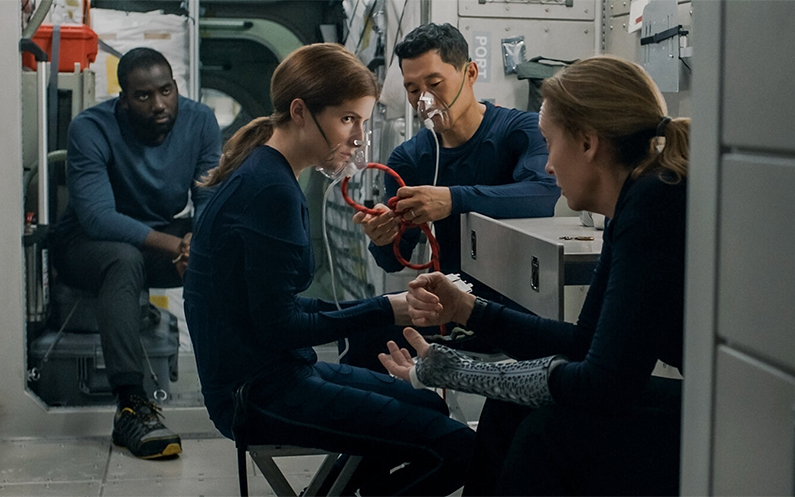Movies about space exploration tend to be variations on the same two basic themes—the expansive possibility of the destination at the end of the journey and the claustrophobic anxiety of the ship during the trip. The creative ways in which any one film balances these tropes is how it distinguishes itself in an increasingly crowded field.
On one end of the spectrum, writers and directors who choose to focus on the confinement of a long-haul craft or a space station have a lot of thorny psychological possibilities to exploit. It’s a fraught fictional setting, where the delicate work of managing resources and keeping the cold dark death of space at bay can supercharge the natural human tension between crewmembers. There’s just so little personal privacy and so much danger. Things are bound to get messy.
“Stowaway,” directed by Joe Penna and available now on Netflix, doubles down on the suffocation and creeping catastrophe of the ‘finite space moving through infinite space’ template. One of the best choices Penna makes, and he makes it right from the first scene, is to never leave the ship unless the crew does. As viewers, we are right in there with them, with no chance of escape from the noises, the tight passageways or the suspicions. All communication between the crew and their team on Earth is one-sided from our perspective, with the incoming voices left completely up to our contextual imaginations. This subtle bit of sound design is a very effective manifestation of “Stowaway’s” nothing in, nothing out aesthetic.
The onboard crew, which includes Toni Collette, Anna Kendrick and Daniel Dae Kim, are on a two-year round trip to Mars. They establish early on that their ship is at its sustainable limits for the three of them, maybe even beyond. So, when a surprise fourth passenger is discovered, tough questions and tougher choices arise.’
It’s when those dilemmas start to pile up that you notice the fiction is better than the science in “Stowaway.” Even without advanced knowledge of the systems and protocols required to pull off something as complicated as interplanetary travel, viewers will have issues with some of the film’s details. Why, for example, are there no redundant components for essential machinery? I find it hard to believe a mission like this would be undertaken without the ability to replace or at least repair life-support equipment. And why are they taking completely untethered space walks? I understand that the heroic risks required by dire circumstances require the breaking of a few rules. Still, some of what happens in “Stowaway” strains credulity too much, even for a film that purposefully avoids big concepts. In fact, it’s exactly this concentrated scale of “Stowaway” that makes the little errors of belief stand out.
Luckily, the performances are good, and the interpersonal drama succeeds in lifting the script out of its humble frame. Shamier Anderson is excellent as the confused interloper, and his co-stars process his presence and the cascading trouble he brings with genuinely conflicted circumspection. It’s strange that we don’t ever get a good explanation for how he got there. But, like details about the Earth lives of the crew, that vagueness feels intentional. Like I said before, nothing gets onto the ship that doesn’t need to be there. This includes lifesaving gear, apparently, but also backstories, motivations and easy answers.
“Stowaway” is not about being on Mars. It’s about being on the way to Mars, in a fragile mini-ecosystem where a single extra person causes a 33% increase of environmental demand. There’s a lot to think about with this scenario and its no-win alternatives, especially if you don’t look too closely at the particulars.





